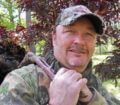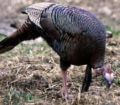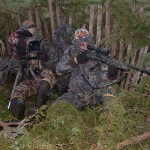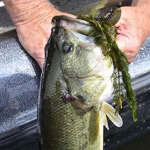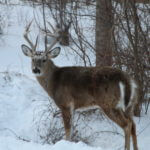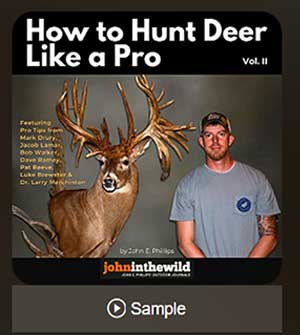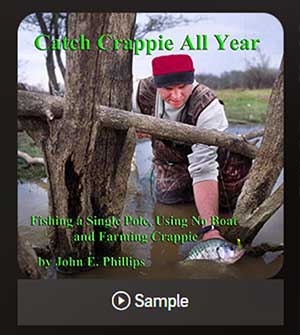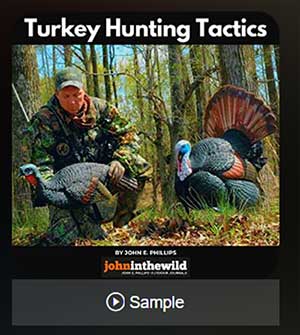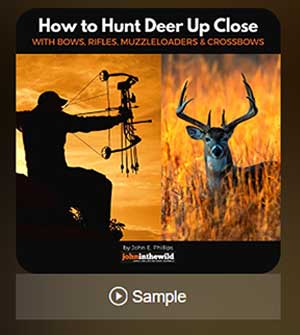Editor’s Note: Longtime turkey hunter, Alex Rutledge of Birch Tree, Missouri, has hosted outdoor TV and radio shows and spends many days in turkey woods each spring.
 This secret to successful turkey hunting builds off the first secret, which is to find the turkey before the season and have multiple turkeys to hunt. Some days turkeys don’t gobble. On rainy, windy days, you can’t hear a turkey gobble from very far away. If a turkey has had any hunting pressure, he may not gobble but one time in the morning and not gobble again all day. The best way to find that turkey and take that turkey, even if he’s not gobbling, is to learn his routine. Turkeys have daily routines just like deer do. They’ll usually fly from a tree, go to water, meet their hens, and depending on the time of the season and the terrain, they may go to a field, an open road or other specific points during the day. If you know where the turkey will go after he flies out of the tree, you have a really-good chance of taking that turkey whether he gobbles or not, as long as you know where the turkey will show-up at various times of the day. This same tactic is one you use for deer hunting. On the days that turkeys don’t gobble much, or you can’t find them, call very sparingly.
This secret to successful turkey hunting builds off the first secret, which is to find the turkey before the season and have multiple turkeys to hunt. Some days turkeys don’t gobble. On rainy, windy days, you can’t hear a turkey gobble from very far away. If a turkey has had any hunting pressure, he may not gobble but one time in the morning and not gobble again all day. The best way to find that turkey and take that turkey, even if he’s not gobbling, is to learn his routine. Turkeys have daily routines just like deer do. They’ll usually fly from a tree, go to water, meet their hens, and depending on the time of the season and the terrain, they may go to a field, an open road or other specific points during the day. If you know where the turkey will go after he flies out of the tree, you have a really-good chance of taking that turkey whether he gobbles or not, as long as you know where the turkey will show-up at various times of the day. This same tactic is one you use for deer hunting. On the days that turkeys don’t gobble much, or you can’t find them, call very sparingly.
I’ve learned that turkeys from Alabama to New York that don’t gobble a lot are usually very-old turkeys or subordinate turkeys that have been beat-up by a dominant gobbler in the area. When a young turkey gets beat-up by an old gobbler, it’s usually because the old gobbler has caught the young turkey trying to gobble to his hens or attempting to get close enough to breed his hens. That young gobbler soon learns that, “If I gobble, I will get beat-up; therefore, if I don’t gobble, I may not get beaten up.” An old turkey may quit gobbling, because he doesn’t feel the need to breed as much as a young turkey does. When old gobblers become too old to mate, they don’t really care about being around hens or younger turkeys, so they don’t have to gobble to let other turkeys know where they are.
 One of the problems that we as turkey hunters often create for ourselves is that just about everything you read or see on TV tells you that turkeys always do what turkeys always do. That’s just not true. Turkeys are individuals, and they can’t read books to know exactly what they’re supposed to do all the time. So, many times the only way you can take one of those turkeys that won’t gobble is to forget he’s a turkey and hunt him like he’s a deer.
One of the problems that we as turkey hunters often create for ourselves is that just about everything you read or see on TV tells you that turkeys always do what turkeys always do. That’s just not true. Turkeys are individuals, and they can’t read books to know exactly what they’re supposed to do all the time. So, many times the only way you can take one of those turkeys that won’t gobble is to forget he’s a turkey and hunt him like he’s a deer.
To learn more about turkey hunting, check out John E. Phillips’ print, Audible and Kindle turkey books at https://johninthewild.com/books/#turkey. For a free copy of John E. Phillips’ “The Turkey Gobbler Getter Manual,” go to https://johninthewild.com/free-books/.

